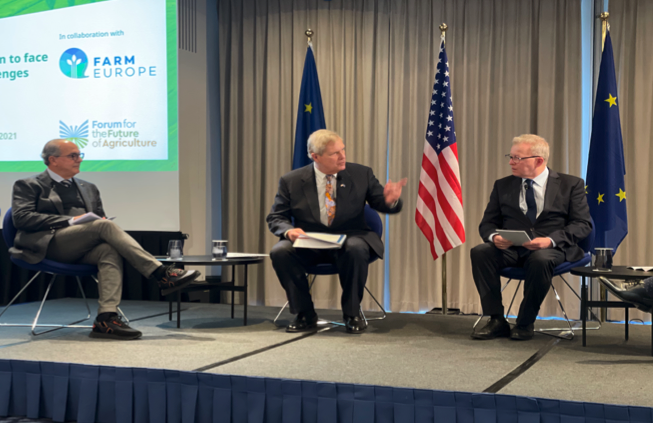Transatlantic cooperation to face global agricultural challenges
During the morning of November 3rd, European Commissioner for Agriculture Janusz Wojciechowski and US Secretary for Agriculture Tom Vilsack announced the launching of a « new chapter » in the EU/US relation during a VIP event in Brussels co-organised by Farm Europe & the Forum for the Future of Agriculture. The occasion was to re-launch the Transatlantic partnership, which links the two continents together to face the challenges of climate change and the transition to sustainable agri-food systems.

The event was opened by João Pacheco Senior Fellow at Farm Europe, who touched on the challenges raised by climate change, and the fact that both the EU and the US share the urgency of mitigating its effects. He stressed that the main question is the how to get there, opening for different paths that can bring us to the same targets, but with divergent consequences. He also pointed out that the pathways chosen by the US and the EU would have a strong impact worldwide, given the two are major world food suppliers. He then summarized the US and EU approaches to climate change: while the US is investing on innovation & technology to foster sustainable productivity growth, the EU is betting on its Green Deal (Farm to Fork & Biodiversity Strategies) and on binding reduction targets. Nevertheless, the European action might be undermined given the studies that have analysed the impacts of the F2F & BDS strategies, notably on their unsustainably economic consequences (increased dependency from imports from third countries, increased food prices, lower farmer’s incomes, etc).
In his opening remarks, US Secretary for agriculture Tom Vilsack underlined that the US & the EU have different paths to reach the same objective of a more sustainable and more productive agricultural system. In order to do that, the US are investing in innovation & science, based on technology solutions. He touched upon trade barriers that, besides slowing down trade, also have an effect on knowledge exchange, which is vital for reaching the target both continents are aiming at. Effective communication is as important as innovation, Vilsack said, stressing that partnerships are essential.
Commissioner Janusz Wojciechowski opened his remarks by underlying the common challenges and opportunities that the two counterparts share and face, pointing out that, sometimes, differences out-shadow the common traits (depopulation in rural areas, small holdings producers, etc.). He pointed out that the pandemic showed the vulnerability of the food systems and underlined the fact that they have to be transformed towards more sustainable models. The Farm to Fork strategy aims at increasing the three aspects of sustainability (environmental, economic, social), but the path to get there is not easy, the Commissioner said, and some efforts have to be made.
He shared with his US colleague the commitment to invest in the promotion of digital technologies, research and innovation, knowledge sharing.
Paolo De Castro, MEP (S&D) and former Italian Minister for agriculture said that regardless of the entity of the problems that we have to deal with or the ambition of the goals that we need to reach, the real challenge is the how to get there. He advocated, therefore, to dedicate more time to the development and the study of innovative solutions. He mentioned genetics, precision agriculture, data analysis as tools that are useful to put into practice the sustainability targets, but that they only represent one piece of the puzzle. Farmers need public support in the form of time & money to make sure that the Farm to Fork strategy does not turn into a de-growth strategy.
Question & Answer session from journalists and one from a farmer, Benjamin Lammert, followed the opening statements